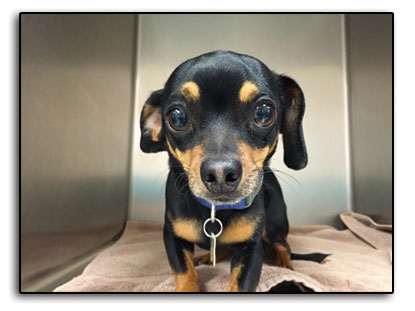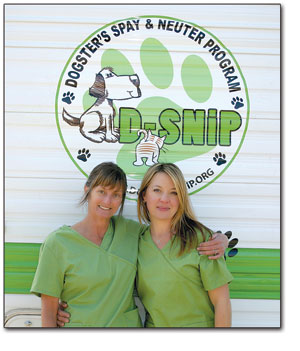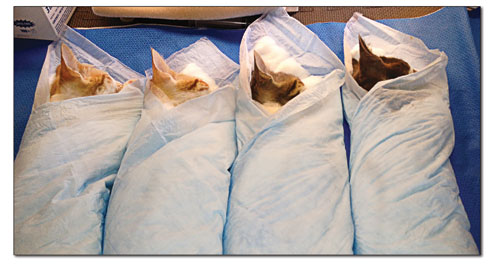
A puppy peers out from his kennel at a recent spay/neuter clinic. As cute as they are, unwanted puppies and kittens are a big problem, locally and nationally. It’s estimated that each year 2.6 million are put down by U.S. shelters. February is Spay and Neuter Awareness Month and local organization Dogster’s Spay and Neuter Program (D-SNiP) is offering free and low-cost spay/neuters throughout the area. /Photo by Sharron Lewis
SNiP/Tuck
Dogster’s Spay & Neuter Program takes a bite out of pet overpopulation
by Jen Reeder
One of the easiest ways to save a life is to spay and neuter your pets. Actually, it’s one of the easiest ways to save many lives; a fertile female cat has an average of one to two litters each year, with four to six kittens per litter. But many people don’t spay or neuter their pets, and there simply isn’t enough space in America’s animal shelters for all of the unwanted dogs and cats. Each year an estimated 1.2 million dogs and 1.4 million cats are euthanized in U.S. shelters.
SPAY DAY SPECIALThe first 10 people to call and sign up for D-SNiP’s World Spay Day promotion on Tues., Feb. 23, will receive a free spay or neuter for their cat or dog by calling 970-903-7836. Upcoming spay/neuter clinics will be held at the La Plata County Humane Society on Feb. 19 and 24, and in Farmington on Feb. 20 and 26. Call 970-247-DOGS for more information. |
Fortunately, nonprofits like Dogster’s Spay & Neuter Program (D-SNiP) are working to combat the issue. Founded in 1999 by Durango residents Karen and Mark Zempel in honor of their Dachshund mix, Dogster, D-SNiP provides low-cost spay/neuter services in Durango and the Four Corners region. In honor of World Spay Day on Feb. 23, they’re even offering 10 free surgeries.
“We meet a lot of people who want to do the right thing but just can’t afford to spend $200 to $300 on a spay/neuter,” said Aimee Henneman, executive director of D-SNiP.
So D-SNiP has a 27-foot mobile unit in which to offer $70 spay/neuters for dogs and $40 for cats (thanks to a recent grant from the Red Acre Foundation, the price will drop next month to $40/dogs and $20/cats). Veterinarian Heather Perkins, veterinary assistant Darcy Williamson and Henneman, a veterinary technician, can also pop up temporary “M*A*S*H* units” in warehouses or other facilities when weather or space prevent using the mobile unit. For larger dogs or senior pets needing additional assistance, they offer vouchers good for surgeries at Durango’s Home Sweet Home Veterinary Clinic and AspenTree Animal Caring Center.
In 2015, the D-SNiP team distributed more than 200 vouchers – and performed 1,523 spay/neuters themselves. Pet owners can also add on a $40 package that includes a rabies vaccine, annual vaccination and microchipping (which includes the lifetime sign-up fee).
“And always a free pedicure!” Henneman said. “That’s the good thing about this job: it’s a happy job. We see lots of animals that are in homes and loved.”
D-SNiP also provides emergency veterinary care and fostering on a case-by-case basis. It’s clear they’re committed to animal welfare: after spaying and neutering over 150 dogs and cats in two days at a clinic in Dulce, N.M., with the Colorado Animal Welfare League, D-SNiP rescued 45 unwanted puppies and arranged for them to be rehomed in Denver.
The team trained with the American Society for the Prevention of Cruelty to Animals (ASPCA) in New York and Durango and adheres to the Association of Shelter Veterinarians’ veterinary medical guidelines for spay/neuter programs.
 Aimee Henneman, left, executive director of D-SNiP, and veterinary assistant Darcy Williamson, right, pose outside the mobile unit. In 2015, D-SNiP performed 1,523 spay/ neuters in the region./ Photo by Sharron Lewis |
Chris Nelson, shelter director of the La Plata County Humane Society, said D-SNiP does “great work” and has excellent post-surgery follow up. The “caring” staff has made an impact by having spay/neuter clinics at the shelter, he said.
“In conjunction with the low cost spay/neuters that we’re doing here, we’ve helped reduce our local intake by over 30 percent over the last few years, which has allowed us to help animals from other shelters and regions where the euthanasia rates are high and those animals are getting put down for space,” Nelson said. “So we’ve been able to bring them here because we have a lower intake.”
Henneman said she hopes residents will talk with their friends and neighbors about the importance of spaying and neutering pets. She said not only does it help reduce the homeless pet population – before 1970, an estimated 20 million pets were euthanized annually in the U.S., a figure drastically reduced by spay/neuter programs – but sterilizing pets also has health benefits such as reducing the risk of cancer, and behavioral benefits such as removing the drive to run away from home to mate. Male cats typically stop spraying if neutered before it becomes a habit. (The American Animal Hospital Association has a position statement that supports neutering cats and dogs as young as 8 weeks old.)
“You’re the responsible one – you have to do what’s right for your pet,” Henneman said. “You are their voice.”
And while parents sometimes say they want their dog or cat to have a litter so their children can witness the “miracle of birth,” Henneman suggests a better alternative is to foster a pregnant animal from the Humane Society, Lisa Parker’s Puppies or RezDawg Rescue.
“Just fostering is a huge help – and adopting,” she said.
This year, Henneman hopes D-SNiP can expand its reach to offer services to rural communities in places like the San Luis Valley in order to help more pets and people.
 A row of swaddled cats recovers after surgery at a D-SNiP clinic. Adult female cats can have up to two litters of six kittens every year./Photo by Sharron Lewis |
“Our shelter does an amazing job here – they don’t euthanize for space. We’re really lucky and they’ve worked really hard to do that. But other areas in the Four Corners don’t have that luxury. So they are putting down totally healthy, purebred dogs, rez dogs, adoptable dogs and cats for no reason other than they just don’t have the space. It’s just not right,” she said. “I’m excited to try to get out a little bit further, where we’re really needed.”
For more information on D-SNiP, visit: www.d-snip.org/ or call 970-247-DOGS. Financial donations can be made online, and checks or donations of gas cards can be mailed to D-SNiP at: 10 Town Plaza, Suite 115. Durango, CO 81301. For more information about World Spay Day, visit: www.humanesociety.org/issues/spay_day/. For myths and facts about spay/neuter from the Humane Society of the United States, visit: http://m.humanesociety.org.
